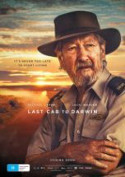
Directed by
Jeremy Sims
124 minutes
Rated M
Reviewed by
Sharon Hurst

Last Cab To Darwin
Synopsis: Rex (Michael Caton) is a single, 70-year-old taxi driver who has never left Broken Hill. He keeps pretty much to himself except for his drinking mates and an occasional dalliance with Polly (Ningali Lawford), his indigenous neighbour. When he is told he has only three months to live he decides to drive his cab to Darwin, where Dr Farmer (Jacki Weaver) has recently been at the forefront of legalising voluntary euthanasia. Hoping to avail himself of the Northern Territory’s new laws on the matter, Rex sets out, on the way picking up a travel pal, Tilly (Mark Coles Smith), a young indigenous AFL hopeful. What Rex learns on this far-from-usual road trip will change how he perceives the end of his life.
Director Jeremy Sims and co-writer Reg Cribb have had this story on the boil for 13 years since they read of the real-life inspiration for it. I am so glad that they have finally made it for it is rich narrative film-making and the various themes it addresses are relevant to us all.
Firstly, there is the morally, legally and politically hot chestnut of end-of-life choices. The issue of euthanasia is explored as while Rex believes that he has the right to end his life on his own terms, his doctor points out that it’s not as simple as it might seem.
This primary concern is played out against the background theme of human connectivity. Rex has never been big on expressing his feelings and only when it appears to be too late does he become aware of the things he should have said to Polly. Altruism is also effectively represented in the relationship between Rex and Julie (Emma Hamilton), a young British nurse travelling and working as a barmaid, but a girl with enough selflessness (albeit that she has her eye on Tilly) that she is prepared to care for Rex as his condition worsens. Love of another kind is found in the film’s representation of mateship. Rex’s drinking pals in Broken Hill are road worker, Dougie (David Field), with John Howard and Alan Dukes filling out the trio of blokey Aussies with their boozy cheer and typical Antipodean humour. The many pub scenes in the film feel authentic and are not played for cheap laughs as with so many “ocker” comedies.
I find particularly impressive the way the writer and director handle the indigenous issues so critical to the narrative. The character of Tilly, expertly portrayed by Smith, is a young man torn between the desire for, and fear of, “making it” in the white world. He is also constrained by the ties to his family and a sense of belonging which comes with a self-destructive drinking culture which the film-makers never condemn but only observe. Similarly Polly is a multi-faceted person – a strong woman, who calls the shots as she sees them and doesn’t let family pressures of her mob override her. The relationship between her and Rex is amusingly and beautifully drawn, with the underlying basic need of all people to belong being never far from our awareness.
With the exception of Jacki Weaver who is mis-cast as the Northern Territory doctor (to paraphrase, Buzz Lightyear, you'd never believe that she's been to medical school) all the actors shine in their roles, with Lawford, Smith and Caton absolute stand-outs. Caton (best known as Darryl Kerrigan in The Castle) captures the complexities of the dying Rex, combining fear, vulnerability, stoicism and the ability to learn, even late in life, what really matters.
Also important is the setting of the Outback and its natural beauty as Rex passes through towns like Oodnadatta, watches breathtaking sunsets, and experiences the thundering might of road trains along the vast ochre highways. The accompanying choice of music, with several Aussie pop classics enhances the whole package.
The smart blending of quintessential Australianness and existential issues of what it means to live, to die and to belong, make Last Cab To Darwin a film to cherish. I strongly encourage everyone to go along with Rex on his fantastic ride.

Want more about this film?


Want something different?




